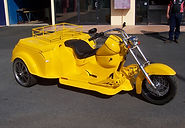

ICVs .........
Individually
Constructed
Vehicles
ICVs - INDIVIDUALLY CONSTRUCTED VEHICLES
We at Autotechnica Aust are ICV specialists. We can take you from conception through to registration with a minimum of fuss.
We have plenty of experience in this field. Please take the time to look at our ICV photo gallery which shows the depth and variety of our experience and expertise.
An Individually Constructed Vehicle (ICV) is a vehicle that is not a Production Vehicle or a Modified Production Vehicle. (Typically an ICV is a one-off type vehicle built to an individual plan or design and includes; a vehicle constructed to the builder’s own unique design, certain kit cars and certain replicas of production vehicles). This is the definition stated in the NCOP and it is the definition used in Queensland and Tasmania.
An ICV is not a production vehicle; rather it is manufactured as a one-off vehicle.
If 3 or more ICVs are manufactured by a person (which includes a business) in a 12 month period then TMR's ICV provisions no longer apply to these vehicles. These vehicles become subject to the vehicle certification procedures of the Motor Vehicle Standards Act (Federal certification).
Vehicles manufactured on a commercial basis are not ICVs. (Note: Vehicle kits do not constitute a vehicle. Kits can be commercially manufactured)
An ICV may be composed of parts from one or more Production Vehicles. The parts do not
need to be new.
ICVs include certain kit cars and certain production vehicle replicas that have been assembled
in accordance with the production limitations mentioned above.
An ICV should comply with the ADRs applicable to its date of manufacture (DOM). The DOM is considered to be the date on which the application for approval is submitted.
It is important for a prospective builder to understand that the ADRs may change during their build process, so keep checking with your engineer. Alternative methods of demonstrating ADR compliance for ICVs may be acceptable.
Queensland and Tasmania have both granted exemptions from compliance with ADRs that require vehicle crash testing and from the fitting of Electronic Stability Control and Anti-lock Brakes.
An ICV does not have to be built by the owner. It is preferably however that the owner has significant involvement.
An ICV is considered to be a new vehicle for registration purposes and therefore will always
require a new Vehicle Identification Number (VIN) to be issued for it.
An ICV, being a new design, need not comply with the requirements of the Modification Codes that relate to modifications of existing Production Vehicles - for example, the ratios of engine size to vehicle weight requirements of Section LA- Engine do not apply.
ICV is a broad category and can include cars, light commercial vehicles, motorcycles, three-wheeler cyclecars as well as trikes. A bolt-on trike conversion attached to an existing motorcycle however is not certified as an ICV.











